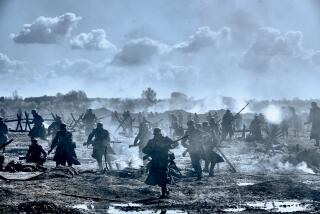Pare Lorentz; Filmed Depression-Era Classics
- Share via
ARMONK, N.Y. — Pare Lorentz, who made two widely heralded Depression-era films using only two cameras, a limited amount of film and no actors, died Wednesday at his home here.
His wife, Elizabeth, said he had suffered in the last five years from bouts of fever that disabled his legs, arms and speech. Doctors could not determine the cause, she said. The filmmaker, who was among the best known chroniclers of Franklin D. Roosevelt’s New Deal, was 86.
A former journalist and film critic, Lorentz went to work for President Roosevelt’s U.S. Resettlement Administration, where he made two films in the late 1930s that are considered prime works in the development of the American documentary.
With a $6,000 budget and no film experience, Lorentz made “The Plow That Broke the Plains” in 1936. It told how mismanagement and lack of soil conservation turned the fertile Great Plains into the Dust Bowl. It was seen by an estimated 10 million people around the world in its initial few months. In 1937, Lorentz’s “The River” documented flooding on the Mississippi River.
Lorentz was appointed by Roosevelt, who wanted to illustrate the natural disasters and the poverty of the 1930s, to head the fledgling U. S. Film Service. In 1940, he made his third highly acclaimed film, “The Fight For Life,” about childbirth among Chicago’s poor and the terrible consequences of malnutrition for mother and child.
The controversial film unit was dissolved when many congressmen questioned the use of federal money to expose slum hospitals and infant mortality at a time when the nation was gearing for war.
During World War II, Lorentz produced films for the military. Later, he formed his own production company and made the 1946 film “The Nuremberg Trials” but could not raise money for a later project about atomic bomb testing on Bikini Atoll.
A native of Clarksburg, W. Va., Lorentz moved to New York in the early 1930s and worked as a film critic for the New York Evening Journal, the original Vanity Fair magazine and King Features Syndicate, owned by William Randolph Hearst.
His autobiography, “FDR’s Movie Maker,” is to be published next month by the University of Nevada Press.
His awards included a 1981 salute from the Academy of Motion Picture Arts and Sciences and a career achievement award from the International Documentary Assn. in 1985.
More to Read
Only good movies
Get the Indie Focus newsletter, Mark Olsen's weekly guide to the world of cinema.
You may occasionally receive promotional content from the Los Angeles Times.









